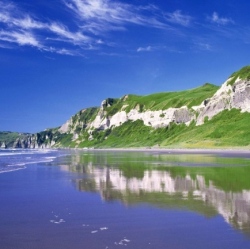
Carbon dioxide levels have risen sharply since the start of the Industrial Age, from 270 parts per million (ppm) in the late 1700s to some 400 ppm in 2015, and scientists say that’s warming the Earth at a dangerous rate. But new research suggests that in recent decades, we’ve been getting by with a little help from our friends.
That is, green plants have ramped up photosynthesis in response to rising carbon dioxide levels, soaking up more of the heat-trapping greenhouse gases and slowing the rate of global warming. It’s welcome news, but don’t get too comfortable: Researchers say it will soon be too hot for plants to keep absorbing so much of our extra carbon dioxide.
“We’ve known for decades that ecosystems have been taking up a lot of the carbon dioxide we emit into the atmosphere,” says Trevor Keenan, an ecologist at Lawrence Berkeley National Laboratory and the lead author of the new study. “Now, they are not taking up near enough to really stop climate change, but they are slowing it down significantly.”
The scientists found that despite increasing emissions from human activity, the growth rate of carbon dioxide in the atmosphere actually held steady from 2002-2014. Without the help of plants, Keenan says, atmospheric carbon dioxide levels would already be at about 460 ppm. “That’s something we don’t expect until about 2050 or 2060,” he adds.
The catch, Keenan explains, is that while plants take in atmospheric carbon dioxide through photosynthesis, using it to grow and support their metabolism, they also release carbon dioxide through a process called respiration. And respiration, Keenan notes, is highly dependent on temperature.
“So, as CO2 is going up, plants take more CO2 from the atmosphere,” Keenan says. “But as temperatures go up, they also release more CO2 into the atmosphere, because of the effect of temperature on respiration.”
In other words, our slowdown in global warming, like all grace periods, is temporary. “As temperatures rise with CO2, that has a net negative effect on the carbon balance of the land surface and on ecosystems,” Keenan says.
